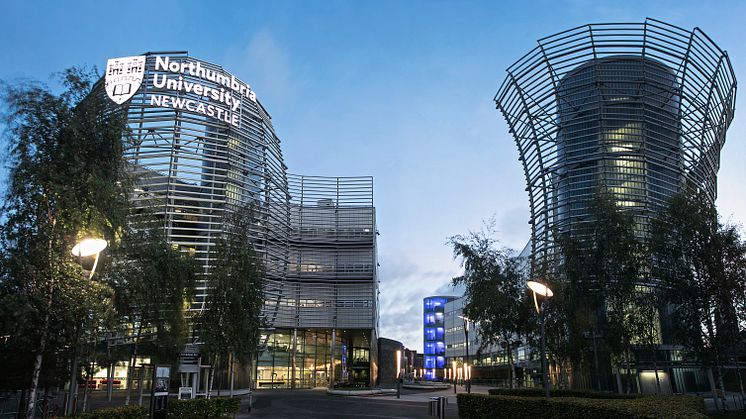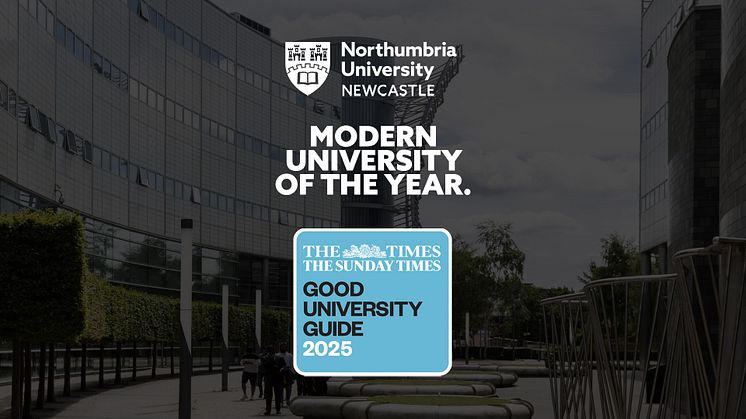
Press release -
Northumbria records biggest rise in research power for second time
Results from the Research Excellence Framework (REF2021) show Northumbria University with the biggest rise in research power ranking of any UK university. Its research power ranking rose to 23rd, having previously risen to 50th in 2014 from 80th in 2008, making Northumbria the sector’s largest riser in research power ranking for the second time.
Sustained progress by Northumbria has given the city of Newcastle a second research-intensive university, bringing a complementary set of research strengths to the city, and creating with Durham a Northern Research Powerhouse with the largest city-area concentration of researchers outside London.
Northumbria’s success is the result of a profound transformation over the last 15 years, combining research with existing areas of strength in relationships with business, skills, enterprise and innovation. The full-time equivalent number of Northumbria researchers assessed as producing world-leading and internationally excellent research has jumped from 56 in 2008, to 207 in 2014 and 840 today. At the same time, the quality and impact of research at Northumbria have risen significantly. On Quality-related (QR) power it ranks 28th, again with the biggest rise on this measure.
Professor Andrew Wathey CBE, Vice-Chancellor and Chief Executive of Northumbria, said: “Alongside a second major leap in research power, the University’s results have improved in quality, in both absolute and relative terms, and its impact ratings have surged ahead. This outcome moves us clearly into territory formerly the preserve of the Russell Group of universities and other research-intensive institutions. Northumbria is the first modern university to cross the clear blue water that separated the old and the new parts of the sector, and others are following.
“Already a global player in education, admitting students from over 137 countries, Northumbria is now well placed to be a global player in research, acting as an ambassador for the North East.
“The city of Newcastle, combined with Durham, is now host to the largest concentration of researchers outside London creating a northern research powerhouse. This is important for the economy of the North East, for inward investment – public and private – for future collaboration between the universities and business, and for the levelling up impacts of research.”
Northumbria’s transformation demonstrates the power of research to effect profound changes in a university’s stature and outlook, and to deliver benefit across the full range of its activities, including the strength of its contributions to the economy and society. It also demonstrates trends found more broadly across the REF2021 exercise: growth outside London and the South East, showing that levelling up is already working; a rise in impact, reflecting Northumbria’s exceptional university-business collaboration, and more broadly showing that Britain is already an innovation nation.
Northumbria has recorded exceptional results, with growing strength across all subjects. It is ranked in the top 10 for research power in seven of the thirteen areas in which it entered the REF, and in the top 26 in all areas. In Geography Northumbria’s research power is second only to Oxford, while in Sport and Exercise Sciences its research is rated seventh for impact. Allied Health are joint first for research environment, Social Work and Policy third for research power behind only London School of Economics and Edinburgh, and History top 10 for research output quality.
Notes to editors:
- Northumbria University, Newcastle is a research-intensive, modern university with a global reputation for academic excellence.
- Northumbria has recorded the biggest rise in research power of any UK University in the Research Excellence Framework (REF)2021 exercise - moving up 27 places to 23rd
- Northumbria is one of the largest universities in the UK with over 35,000 students from 137 countries
REF
The REF provides a unique analysis of research across UK universities. It shows where research stands in terms of quality and output on the domestic and global stage, presents the real impact research has on our society, and highlights the real-world benefits it brings. The REF is also used to inform and provide accountability for the allocation of around £2 billion in public funding invested in research annually.
1. The REF was undertaken by the four higher education funding bodies for England, Scotland, Wales and Northern Ireland: Research England, the Scottish Funding Council (SFC), the Higher Education Funding Council for Wales (HEFCW), and the Department for the Economy, Northern Ireland (DfE). REF 2021 was managed on behalf of the funding bodies by a UK team based at Research England.
2. The REF was last conducted in 2014. It replaced the previous Research Assessment Exercise (RAE).
3. The results also provide benchmarks and public information about the research performance of universities. The results will be used by the four UK higher education funding bodies to allocate research funding to universities – around £2 billion per year from 2022-23.
4. Any UK institution meeting the definition of an higher education institution (HEI), as set out in the REF ‘Guidance on submissions’ (REF 2019/01) was eligible to participate in the exercise.
5. The REF is a discipline-based expert review process. 34 expert sub-panels, working under the guidance of four main panels, reviewed the submissions and made judgements on their quality. The panels comprised 900 academics, including 38 international members, and 220 users of research.
6. 157 HEIs participated, making a total of 1,878 submissions to the 34 panels. Institutions’ submissions ranged from four staff submitted to a single panel, to over 3,000 staff submitted to 30 panels.
7. The results are produced as ‘overall quality profiles’ which show the proportions of submitted activity judged to have met each quality level from 4* to unclassified. The quality levels are:
• 4* World-leading
• 3* Internationally excellent
• 2* Recognised internationally
• 1* Recognised nationally
• U Unclassified
8. The overall quality profile awarded to each submission is derived from three elements that were assessed: a. The quality of research outputs. This contributes 60 per cent to the overall quality profile. The panels reviewed 185,594 submitted research outputs.
b. The social, economic and cultural impact of research. This contributes 25 per cent of the overall quality profile. The panels reviewed 6,781 submitted impact case studies.
c. The research environment. This contributes 15 per cent of the overall quality profile. The panels reviewed submitted environment statements and statistical data on research income and doctoral degrees. A statement about the overall institution’s environment was provided, to inform and contextualise the panel’s assessment.
9. An independent review of REF 2014, led by Lord Stern in 2016, introduced significant changes into the assessment framework for REF 2021, including the approach to submitting staff and outputs. These changes mean the exercise provides a different national picture of research quality, therefore, to its predecessor, limiting the extent to which meaningful comparisons can be drawn across the outcomes of the two exercises – for outputs in particular.
10. The outcomes of the REF are provided as quality profiles. We publish the results for the submissions made by each HEI. Within each UOA, submitting institutions are listed in alphabetical order. The REF team and the UK funding bodies do not produce single-number figures or league tables from the REF results.
11. Source for wider evidence about UK research performance in the period 2014 to 2020 is Clarivate Analytics. Forthcoming analysis will be available on the REF website.
12. For further information, see www.ref.ac.uk
Topics
Categories
Northumbria is a research-intensive modern university with a global reputation for academic excellence. Find out more about us at www.northumbria.ac.uk --- Please contact our Media and Communications team at media.communications@northumbria.ac.uk with any media enquiries or interview requests ---













